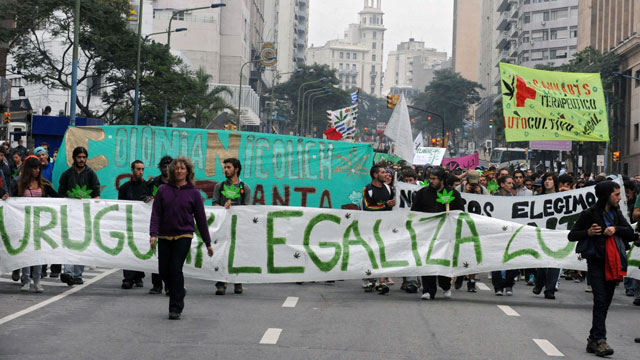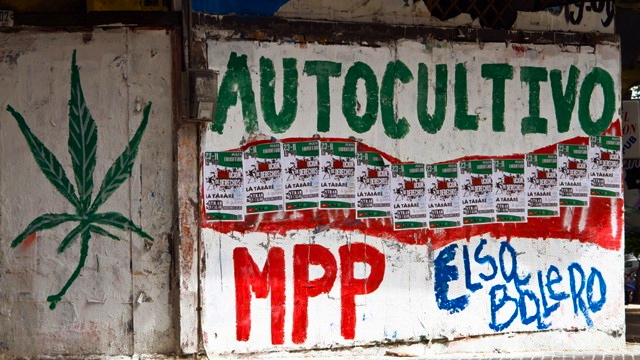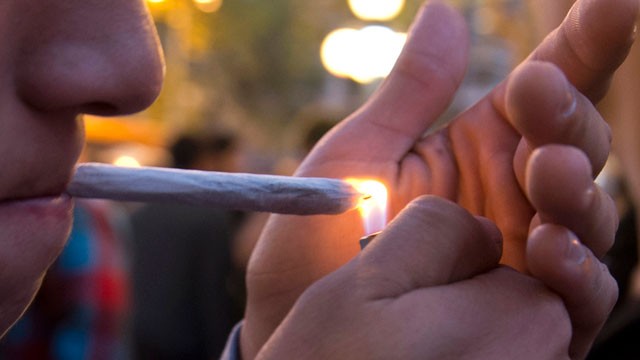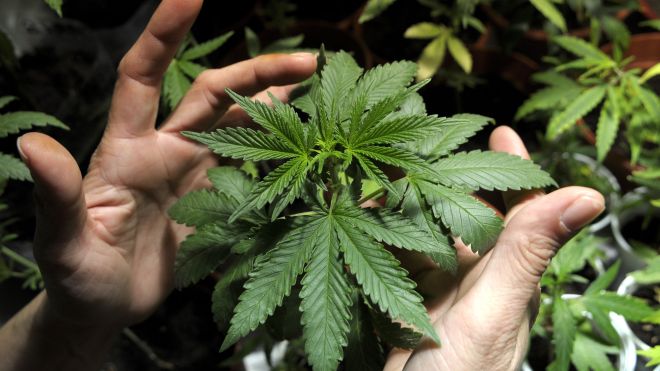
The "weed brothers" have been turning away potential pot-buying customers from their tiny shop in downtown Montevideo quite a lot recently. "They come about three times a day to ask if we're selling marijuana yet," say Juan and Enrique Tubino. They've had to put up a sign stating: "We don't sell marijuana."
It's not just because the Tubino brothers keep their shop packed high with cannabis pipes, herb grinders and rolling paper – or because of the giant green hookah in the display window – that would-be customers are pouring in. The big excitement is because tiny Uruguay, a country so small that a single dialing code covers the whole territory, is about to become the first in the world to legalize the production and sale of marijuana. The Tubinos are hoping that their Yuyo Brothers shop (yuyo is Spanish for weed) can capitalize on its fame among Montevideo cannabis users to sell legally what goes into the pipes.
"When people think of liberal drug laws, they tend to think of Holland, but actually it's Uruguay that has always been at the forefront," says Hannah Hetzer, a young dual-nationality Austrian-American from the Drug Policy Alliance (DPA) who landed in Uruguay in February to help local drug reform activists. The DPA is a weighty US drug policy reform NGO that can boast tycoons such as George Soros and Richard Branson and celebrities including Sting on its board of directors. "Uruguay never banned private consumption of any drug at all, including hard drugs such as heroin, even though their production and sale is banned," says Hetzer.
When Jose Mujica, Uruguay's president, put his considerable political weight behind drug law reform in this small but ultra-liberal South American state, the DPA sent Hetzer to Montevideo to guide money from Soros's Open Society Foundations into an unprecedented media campaign that helped to push the groundbreaking legal changes through the lower house of congress. Approval by the senate, where Mujica holds a strong majority, is expected soon.
Other Latin American countries, such as Colombia and Bolivia, emboldened by Uruguay's move and frustrated over their own failure to beat the powerful and bloody illegal cartels that control drug production in the region, will be looking carefully at how the reform fares.
The law will grant licences to private producers for large-scale cannabis farming and regulate the distribution of marijuana at controlled prices through pharmacies to registered consumers, all under the strict eye of the government. It will also allow home growing of up to six plants per household, and the creation of "cannabis clubs" in which home growers will be able to band together to produce marijuana in greater quantities as long as it is not for sale.
This is music to the ears of 27-year-old Enrique Tubino, the youngest of the two "weed brothers", who has been growing cannabis illegally at home for years. "Now we'll be able to grow our weed in peace without having to hide. That's going to be a big change, in our heads, in the concept, on the street. There's going to be many colourful balconies now," he laughs.
Marijuana consumption seems to be high in Uruguay, especially among young people. "Surveys show that about 4.5% of the population smokes marijuana on a more or less regular basis," says Sebastian Sabini, the 32-year-old bearded and sneaker-wearing congressman who drafted the new law. "I've never seen people smoking on the street as much as they do here," says Hetzer. "It seems more widespread than anywhere else."
That and a long liberal tradition regarding matters such as a strict separation of church and state helped to ease the passage of the new law. When Argentina's Cardinal Jorge Bergoglio became Pope Francis in February, Mujica decided not to fly to Rome for his inauguration.
"Uruguay is a totally lay country," explained Mujica at the time. "There is separation of church and state since the last century. Uruguay is different from the rest of Latin America regarding this. We have great respect, there is freedom of worship, but we are not believers."
Although approval for the reform is low, both critics and supporters agree that opposition is not virulent. "Someone scrawled 'Sabini is a junkie' on a city wall," says Sabini. But that is meek protest even for distinctly civil Uruguay, where political opponents seldom quarrel too loudly. With a population of only 3.3 million, it is hard for politicians and activists not to know personally those on the other side of the ideological fence.
Even though support for the reform is low among the population at large, there is no strong vocal opposition so far. "Polls placed those against the law at about 66% at the start of this year," says Hetzer. "And even after our intense media campaign, that only dropped by about three points, but it is not an issue that could sway an election. It is not an important issue, even for those against it."
Opponents of the law disagree with technical aspects, but not the essence. "Smoking marijuana is legal in Uruguay, you can't be arrested for smoking on the street; you could smoke here in front of the building of congress without any problem, even before this law," says Javier García, a congressman who voted against the change. "I'm a doctor and I don't agree with the law for medical reasons. I don't believe that marijuana is not a stepping stone to harder drugs such as cocaine, as its proponents allege. I feel we just don't have enough scientific research yet to back this law; there's no international precedent. It raises the risk of drug tourism and consumption is already legal, so what's the basis for it? Not individual freedom, because private consumption is already guaranteed."
Supporters and critics of the reform both see the ghost of American "imperialism" behind legalization, on the one hand, and the war against drugs on the other. Sabini sees US support for the war on drugs in Latin America as a tool for dominance over weak nations. "The US provides the arms and we provide the dead," he says.
But García sees instead a new brand of "U.S. imperialism" behind powerful NGOs such as the Drug Policy Alliance pumping dollars into Uruguay to support the new law. "They are using us as a testing ground for reforms that they wouldn't dare test at home. They're treating us like guinea pigs."
Hetzer sees it differently. "Uruguay is the perfect country to do this; it's small, it's got good institutions, very little corruption," she says. "And this drug law reform follows in the same year that Uruguay legalized abortion and same-sex marriage. It's part of a broader trend towards a more liberal society that's taking place; it's not just a single issue."
Despite the consensus, some aspects of the law remain contested. Small entrepreneurs such as the Tubino brothers are unhappy about only pharmacies so far being allowed to sell marijuana.
"That's giving too much power to the multinationals or anyone with big money, as they would be the only ones who could finance such a distribution system," says Enrique Tubino. "There's a rumor that tobacco companies are studying this, which would be the worst. Can you imagine? The Green Marlboro!"
But Sabini defends the decision to grant pharmacies a marijuana monopoly.
"Pharmacies have more experience selling drugs for medicinal use," he says. "They have nationwide reach, they have trained personnel, security precautions in place for handling important sums of money and a data system for prescriptions that can be adapted to the sale of marijuana only to registered users."
The Tubino brothers are not convinced. "We've been having offers from investors from Spain and Holland. Those are big tigers," says Juan Tubino.
"We'd like the government to set up some protectionism to defend us Uruguayans against that. But if it doesn't, we'll just have to grow tough nails and fight against the tigers, too."
3 WAYS TO SHOW YOUR SUPPORT
- Log in to post comments



















